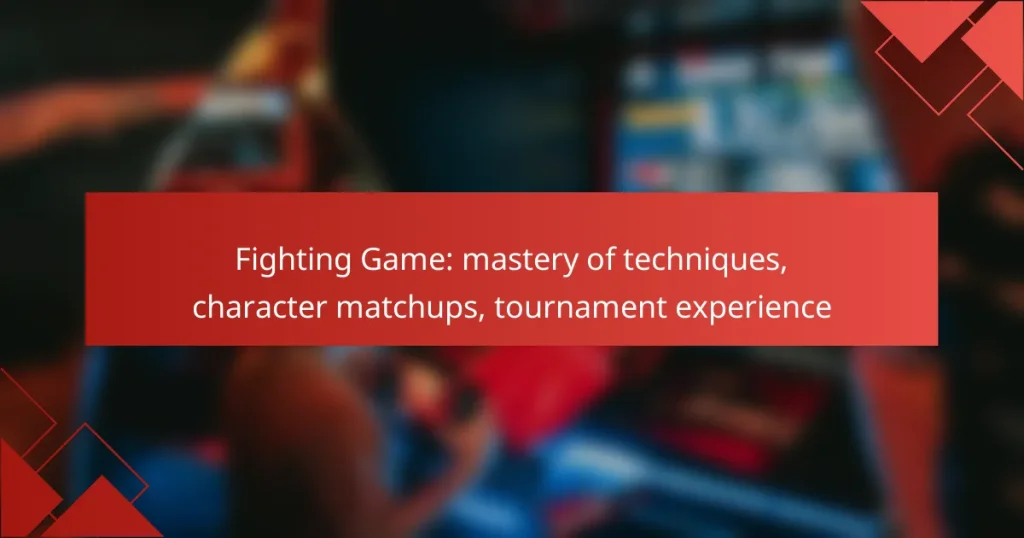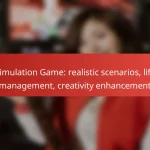Mastering techniques in fighting games requires dedication to practice, a deep understanding of game mechanics, and a strategic approach to character matchups. By refining your skills and learning from experienced players, you can improve your gameplay and increase your chances of success in tournaments. Engaging with the competitive community and analyzing your performance will further enhance your understanding of the intricacies involved in each matchup.
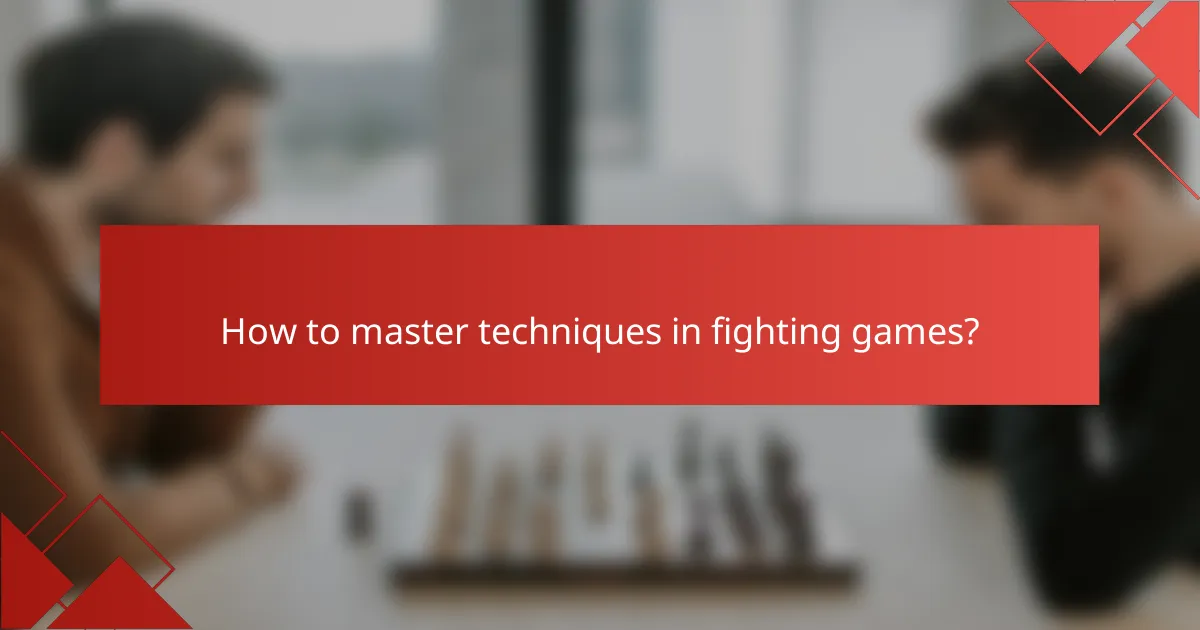
How to master techniques in fighting games?
Mastering techniques in fighting games involves consistent practice, understanding game mechanics, and analyzing matchups. Focus on refining your skills through targeted exercises and learning from experienced players to enhance your gameplay.
Practice combos and execution
Practicing combos is essential for mastering fighting games. Start with simple sequences and gradually increase complexity as you become comfortable. Aim for execution consistency, targeting a success rate of around 80% during practice sessions.
Utilize a practice mode to repeat combos without the pressure of a match. Break down each combo into smaller parts to understand timing and inputs, which can help you execute them more fluidly in real matches.
Study frame data
Understanding frame data is crucial for mastering techniques in fighting games. Frame data provides insights into the speed and recovery of moves, helping you identify safe options and punishable actions. Familiarize yourself with the frame advantage and disadvantage of your character’s moves.
Use online resources or community tools to access frame data for your character and opponents. This knowledge will enable you to make informed decisions during matches, improving your strategic play.
Utilize training modes
Training modes are invaluable for mastering techniques in fighting games. They allow you to practice specific scenarios, such as countering attacks or executing advanced techniques without distractions. Spend time in these modes to refine your skills and test different strategies.
Many games offer customizable training options, such as adjusting AI behavior or setting up specific situations. Take advantage of these features to simulate real match conditions and prepare for various character matchups.
Watch expert gameplay
Watching expert gameplay can significantly enhance your understanding of techniques and strategies. Observe how top players execute combos, manage spacing, and adapt to their opponents. This can provide insights into advanced techniques you may not have considered.
Platforms like Twitch or YouTube host numerous fighting game tournaments and streams. Take notes on player decisions and try to implement similar strategies in your own gameplay to improve your performance.
Join online communities
Joining online communities can provide support and resources for mastering techniques in fighting games. Engage with forums, social media groups, or Discord servers where players share tips, strategies, and experiences. This interaction can help you learn from others and stay updated on the latest game developments.
Participating in community events, such as tournaments or casual matches, can also provide practical experience. These interactions can help you apply what you’ve learned and gain valuable feedback from fellow players.
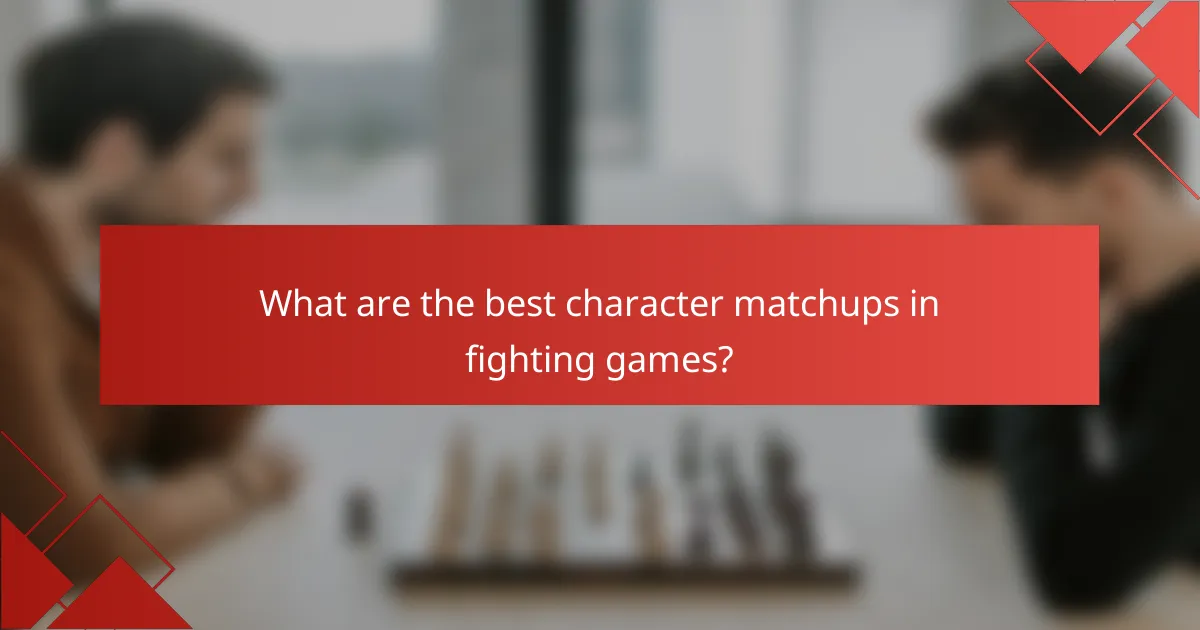
What are the best character matchups in fighting games?
The best character matchups in fighting games depend on the strengths and weaknesses of each character, as well as the player’s skill level. Understanding these matchups can significantly influence the outcome of a match, especially in competitive settings.
Top tier character pairings
Top tier character pairings often feature characters that complement each other’s strengths, making them formidable in battles. For example, pairing a strong grappler with a fast-paced rushdown character can create a balanced team that can adapt to various situations. Players should focus on understanding how these characters interact to maximize their effectiveness.
Common examples include pairing a zoning character like Dhalsim with a rushdown character like Cammy, as this combination allows for both long-range control and aggressive pressure. Evaluating the synergy between characters can lead to more strategic gameplay.
Counter-picking strategies
Counter-picking involves selecting a character that has a favorable matchup against the opponent’s choice. This strategy requires knowledge of both characters’ abilities and how they interact. For instance, if facing a character with strong projectiles, choosing a character with mobility or reflect abilities can turn the tide in your favor.
It’s crucial to remain adaptable and ready to switch characters based on the opponent’s selection. Players should practice with multiple characters to develop a deeper understanding of matchups and improve their counter-picking skills.
Character strengths and weaknesses
Each character in a fighting game has unique strengths and weaknesses that influence matchups. For example, a character with high damage output may lack mobility, making them vulnerable to faster opponents. Understanding these traits allows players to exploit weaknesses while protecting their own vulnerabilities.
Players should analyze their character’s strengths, such as range, speed, or combo potential, and how these can be leveraged against specific opponents. Keeping a mental note of common weaknesses, like poor defense or slow recovery, can provide a strategic advantage during matches.

How to gain tournament experience in the UK?
Gaining tournament experience in the UK involves actively participating in various competitive events, both locally and online. Engaging with the community and analyzing past performances can significantly enhance your skills and understanding of matchups.
Participate in local tournaments
Local tournaments are a great way to gain firsthand experience in a competitive environment. Look for events hosted at gaming centers, community halls, or universities, which often feature entry fees ranging from £5 to £20. Engaging with local players helps you understand the meta and improve your techniques.
When participating, focus on adapting your strategies based on the characters you face. This will not only improve your gameplay but also help you learn how to counter various matchups effectively. Don’t hesitate to ask for feedback from more experienced players after your matches.
Join online tournaments
Online tournaments provide a flexible way to compete without geographical limitations. Platforms like Smash.gg or Challonge often host events with varying skill levels, allowing you to find competitions that suit your experience. Entry fees can range from free to around £10, depending on the tournament.
Make sure to familiarize yourself with the online format, as lag and connection issues can affect performance. Practice your techniques in online lobbies to prepare for the specific challenges of online play, such as timing and spacing adjustments.
Analyze past tournament matches
Reviewing past tournament matches is crucial for understanding what strategies work and what doesn’t. Platforms like YouTube or Twitch often have recorded matches that you can analyze. Focus on high-level play to see how top players handle various situations and matchups.
Take notes on character interactions and player tendencies. Look for patterns in decision-making and execution. This analysis can help you refine your own gameplay and prepare for future tournaments by identifying areas for improvement.
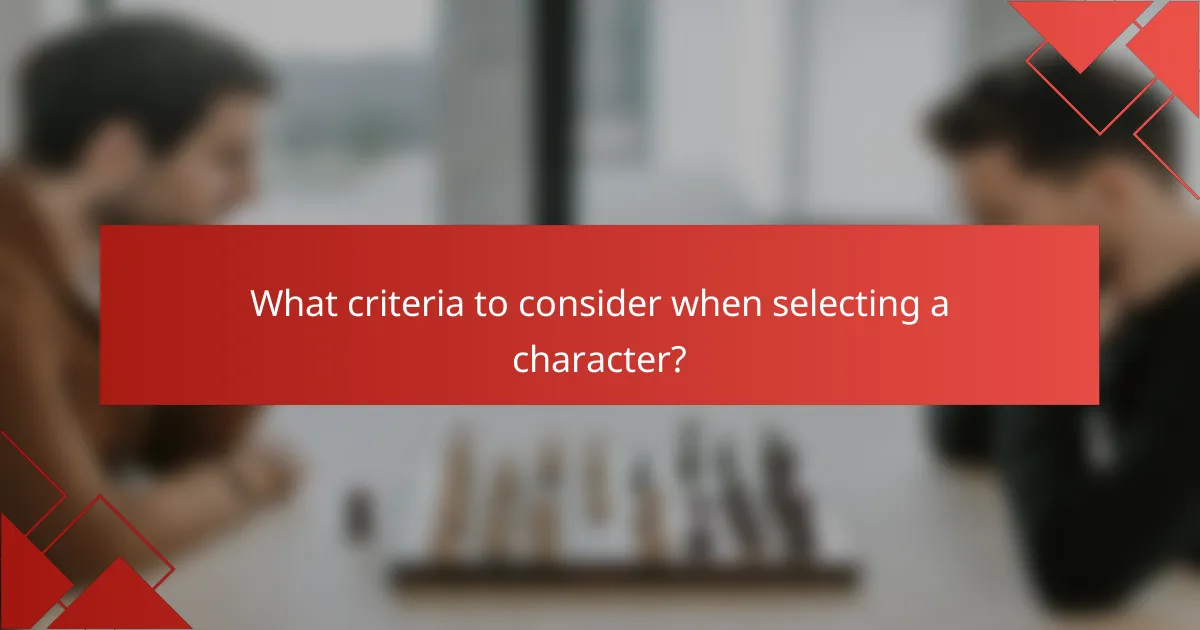
What criteria to consider when selecting a character?
Selecting a character in a fighting game involves evaluating factors such as playstyle compatibility, character complexity, and meta relevance. These criteria help ensure that your chosen character aligns with your strengths and the current competitive landscape.
Playstyle compatibility
Playstyle compatibility refers to how well a character’s strengths and abilities match your personal approach to gameplay. If you prefer aggressive tactics, look for characters with strong rushdown capabilities. Conversely, if you favor a defensive style, consider characters that excel in zoning or countering.
To assess compatibility, experiment with different characters in practice mode. Pay attention to how their moveset aligns with your instincts and strategies. This will help you find a character that feels natural to you.
Character complexity
Character complexity involves the skill level required to effectively use a character’s abilities. Some characters are beginner-friendly with straightforward mechanics, while others may have intricate combos and advanced techniques that require extensive practice. Choose a character that matches your current skill level and willingness to invest time in mastering them.
As a guideline, beginners might benefit from characters with fewer special moves and simpler combos, while advanced players can explore more complex characters that offer higher rewards for skillful play. Always consider how much time you can dedicate to learning and refining your character.
Meta relevance
Meta relevance refers to how effective a character is in the current competitive environment. This can change frequently due to balance patches and shifts in player strategies. Staying informed about which characters are performing well in tournaments can guide your selection process.
To gauge meta relevance, follow tournament results and community discussions. Characters that consistently rank high in competitive play often have strengths that exploit current game mechanics. However, don’t solely rely on meta; choose a character you enjoy playing to maintain motivation and engagement.
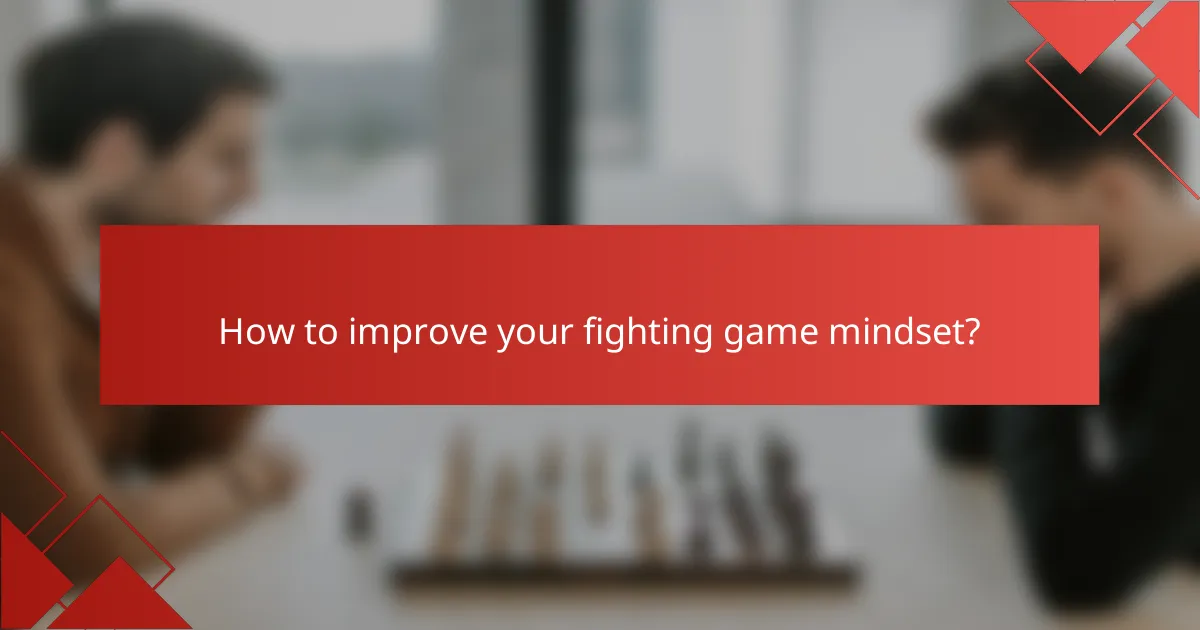
How to improve your fighting game mindset?
Improving your fighting game mindset involves cultivating mental resilience, focus, and adaptability. These elements are crucial for overcoming challenges and enhancing performance in competitive settings.
Focus on mental resilience
Mental resilience is the ability to bounce back from setbacks and maintain composure during intense matches. This skill is essential for fighting game players, as they often face unexpected challenges and losses.
To build mental resilience, practice visualization techniques where you imagine overcoming difficult scenarios in matches. Additionally, engage in regular self-reflection to analyze your performance and identify areas for improvement without being overly critical.
Consider setting small, achievable goals for each practice session or tournament. This approach helps you focus on progress rather than perfection, reducing pressure and fostering a positive mindset.
